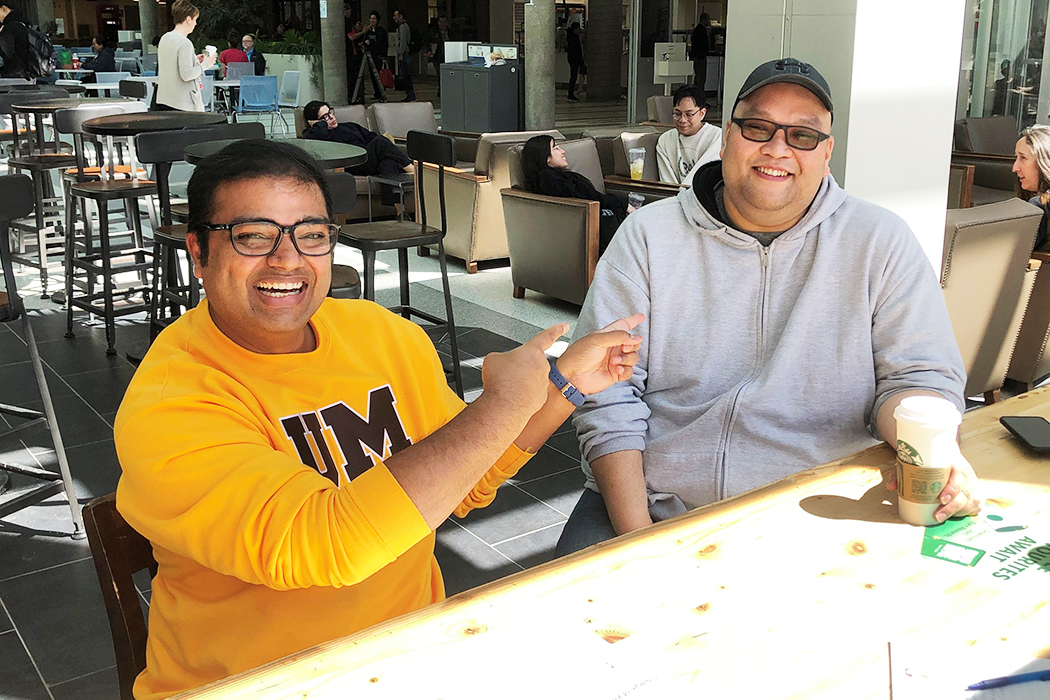
Nitesh Sanghai (left) and Billy Vuong (right)
Pharmacy peer support network offers support, guidance and empowerment
For pharmacy graduate students in need, help is only a phone call away.
“It doesn’t matter if it’s day or night,” said Nitesh Sanghai, coordinator of the peer-to-peer student group in the College of Pharmacy and a student in the PhD program. “You just call.”
Sometimes a master’s or PhD student might reach out over something simple, like asking a classmate to read over a proposal before they hand it in. Other times, they may need the kind of support only possible from someone who has been in their shoes. That’s where the peer-to-peer student group comes in.
“I worked in safety science back home in India before I came here,” said Sanghai. “I knew how everything worked. Here, I didn’t know anything. I didn’t know anybody.”
For international students, the issue may be something a native-born student might take for granted, like how to speak to a professor. “In India, and in many other Asian countries, you say ‘sir.” You would never address them by their name. But here it’s okay.” That’s something Sanghai didn’t realize until he started studying at the University of Manitoba and a fact he now shares with new students.
But it’s not just the local culture that a new student might need help with – it could be anything.
“On my first day here, I fell and hit my head,” said Nitesh. He found his way to the Health Sciences Centre, bleeding. He pointed to his head, showing a scar from the stitches. At home he might have called family or a friend, just to help him get settled and focus on school. “I was very helpless; I didn’t know anybody yet.”
It’s a different story for Billy Vuong, a PhD candidate in the College of Pharmacy, who was born in Winnipeg. “I haven’t really experienced the struggle international students have. I did my master’s program at UM and I know how things work. “
For Vuong, it’s just natural that he would lend a hand when someone needs it. He doesn’t even consider it mentoring. “If anyone needs help with something, I would help out,” he shrugged.
Despite his casual attitude, Vuong’s contributions have made him a valuable member of the peer-to-peer program. So much so that he received an award from the program at Research Day this spring “I really wasn’t expecting it. It’s something I viewed as a normal responsibility. “
“I’m so proud of these students,” said Dr. Lalitha Raman-Wilms, dean of the College of Pharmacy. “This came from them, because they care about one another’s well-being and their success. This exemplifies the compassion, empathy and leadership we want to see in all our learners.”
Peer-to-Peer was started by graduate students for graduate students, but it also comes with training from UM Student Services, so they know when and how to reach out to the experts. “We take student wellness very seriously,” said Raman-Wilms. “We want to be sure students get the right kind of help when they need it.”
The 24-hour aspect of the support group began this year, with a core group of graduate students willing to accept the responsibility of picking up calls whenever they come. They’re still dreaming big and are planning to add some funds so that mentors can take a mentee for a coffee or lunch without being out of pocket.
These casual meetings are for peers to share research opportunities, support each other and diversify the peer mentorship program. They’re also working towards what they call the “Inspire Mentorship Program,” where senior students and postdoctoral felllows discuss science, work-life balance, professionalism and motivation.
“We do all of this because we want to see each other succeed,” said Nitesh. “We want to empower each other and bring each other up.”






